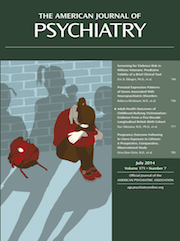Response to Silberman
To the Editor: We appreciate Dr. Silberman’s characterization of our article as a welcome demonstration of the benefits of using benzodiazepines for the treatment of social anxiety disorder, but would like to address a number of issues raised by his letter. The study was designed to examine potential “next-step” pharmacological strategies for patients remaining symptomatic despite treatment with a selective serotonin reuptake inhibitor (SSRI)—it was thus intended as a study of treatment-resistant patients and not as one examining the question of the comparative benefits of potential first-line interventions such as SSRIs and benzodiazepines for social anxiety or other anxiety disorders.
We do, however, agree that serious reconsideration of the role of benzodiazepines for the treatment of anxiety disorders is warranted, particularly in light of evidence that they can be effective and well tolerated, and continue to be widely prescribed (1). A recent meta-analysis of studies examining the relative efficacy and tolerability of benzodiazepines and antidepressants for the treatment of anxiety disorders (2) did not demonstrate a significant efficacy advantage for either class of agents, although benzodiazepines tended to be better tolerated. However, the vast majority of studies examined in this analysis included the use of the older tricyclic agents rather than the now more commonly used SSRIs. But important questions about the use of benzodiazepines in practice remain to be conclusively addressed. Although anxious patients with remote histories of substance abuse or mild depressive symptoms can apparently be given benzodiazepines safely, it is also clear that these agents can be ineffective for or worsen depression (if used as monotherapy), or can be abused by patients with a substance abuse diathesis. Furthermore, some patients experience significant difficulties discontinuing these agents, and there is some evidence, although inconclusive, that they may hamper the efficacy of cognitive-behavioral therapy in some patients.
Taking into consideration the potential benefits of benzodiazepines and antidepressants, but recognizing the important factors that may influence their application in clinical practice, we too believe that further study in clinically relevant populations, including the development of practice guidelines for responsible prescription of benzodiazepines (3), would be of service to our patients and to the field.
1 : Results of a naturalistic longitudinal study of benzodiazepine and SSRI use in the treatment of generalized anxiety disorder and social phobia. Depress Anxiety 2005; 22:59–67Crossref, Medline, Google Scholar
2 : Efficacy and tolerability of benzodiazepines versus antidepressants in anxiety disorders: a systematic review and meta-analysis. Psychother Psychosom 2013; 82:355–362Crossref, Medline, Google Scholar
3 : Are there guidelines for the responsible prescription of benzodiazepines? Can J Psychiatry 2010; 55:709–714Crossref, Medline, Google Scholar



